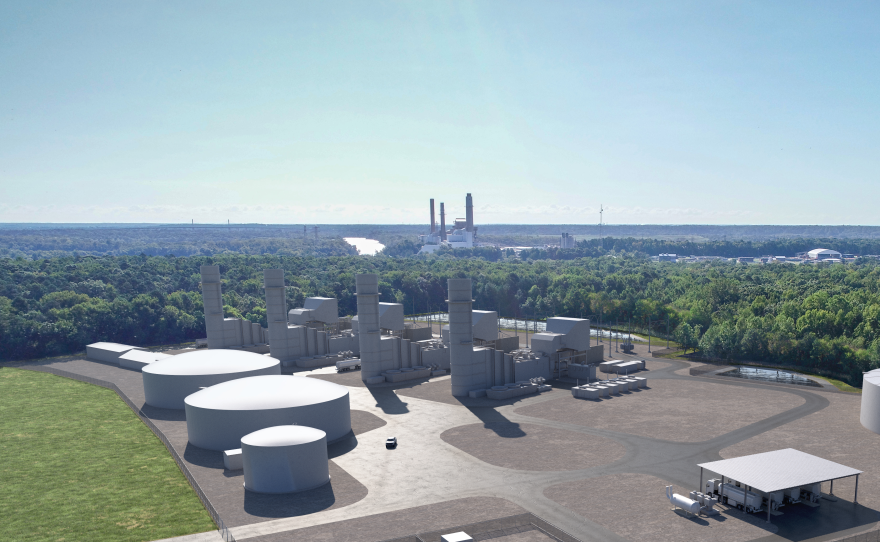National environmental activist, journalist and author Bill McKibben joined a virtual press conference hosted by the Chesapeake Climate Action Network on Wednesday to oppose a proposed natural gas plant in Chesterfield County.
The Chesterfield Energy Reliability Center was proposed by Dominion Energy earlier this summer. It would include four, 250-Megawatt rated natural gas-fired turbines reserved for use during times of peak demand. That’s enough to power 250,000 homes.
McKibben said the plan struck him as ironic, given the heat records being broken worldwide this summer — whether it’s ocean surface temperatures that have comfortably broken daily records since March, the persistent heat in the south and southeastern U.S., or the hottest month worldwide on record. All have been worsened by human-caused climate change, a result of persistent carbon dioxide emissions since the Industrial Revolution.
“Where the science is is an all-out plea for the rapid transition off of fossil fuels. Not building new stuff, but closing down just as fast as we can the stuff that we've got,” McKibben said.
Responding to concerns raised by the environmentalists, Dominion spokesperson Jeremy Slayton focused on reliability.
“Offshore wind only works about 50% of the time, solar about 25% and batteries store electricity for 4-6 hours. That is why we need an all-of-the-above approach — renewables plus nuclear plus always-ready natural gas,” Slayton said.
Dominion says it’s “all-in” on renewables, with less than 15% of its planned new generation consisting of natural gas. According to its 2023 Integrated Resource Plan, Dominion plans to add at least 26,980 MW — up to 37,864 MW — of renewable and storage capacity in the next 25 years, as well as 970 MW or more — up to 9,300 MW — of gas. The company says gas is essential to meeting customer demand peaks, which generally occur during evening hours or in periods of high heat and cold.
Others have raised the issue of reliability during the transition to renewables as well, including Republican Commissioner Mark Christie of the Federal Energy Regulatory Commission. Christie previously served as a commissioner at Virginia’s State Corporation Commission.
In May 2023 testimony to the U.S. Senate Energy and Natural Resources Committee, Christie contended that the rate of planned retirements through utility plans or state mandates (as with the Virginia Clean Economy Act) will result in a reliability crisis in the near future:
“In summary, the core problem is this: Dispatchable generating resources are retiring far too quickly and in quantities that threaten our ability to keep the lights on. The problem generally is not the addition of intermittent resources, primarily wind and solar, but the far too rapid subtraction of dispatchable resources, especially coal and gas,” Christie wrote.
Christie highlighted dated transmission market systems and legal threats to natural gas transportation as key factors in reliability concerns.
Acting FERC Chair Willie Phillips, a Democrat, has raised reliability concerns about natural gas, too, saying the U.S. has regulatory gaps where the gas system and the grid meet. And a PJM Interconnection report found that shortfalls in expected gas generation contributed to grid stress during 2022 Winter Storm Elliott.
Cale Jaffe, director of the Environmental Law and Community Engagement Clinic at the University of Virginia, said during the press conference he was concerned with Dominion’s most recent IRP. It lays out five scenarios for Dominion’s energy portfolio in the next 15 years — and all of them call for at least 970 MW of new fossil fuel generation.
McKibben and others on the call said they believe Dominion is pursuing large-scale, centralized projects like the Reliability Center and small modular reactors because they’re expensive projects that are lucrative to shareholders.
“So that's what we're seeing here — a zombie relic of an old fossil fuel age that we do not need, cannot have unless we're committed to endless summers like the one we've been struggling through this year,” McKibben said.
Attorney Gregory Abbott spoke on that in testimony filed with the State Corporation Commission responding to Dominion’s 2023 IRP on behalf of the nonprofit group Appalachian Voices. He argued Dominion has an interest in high-cost capital projects, which offer very reliable investments to shareholders.
Dominion is legally entitled to recoup all of its investments on such projects, plus profits on top of that.
“It sets the stage for multi-billion-dollar investments that Dominion’s customers will pay for decades to come. If a future snapshot in time changes, based on new public policy goals or market dynamics, ratepayers are stuck with paying for these sunk costs,” Abbott wrote.
When asked about those assertions, Slayton said, “Our focus is really on providing reliability for our customers.”
Dominion expects the plant to be online by 2027.
Editor's note: Dominion Energy is a VPM donor.











